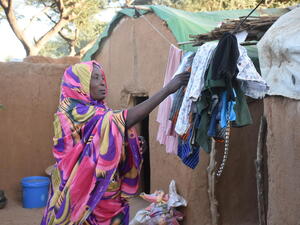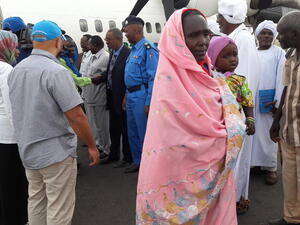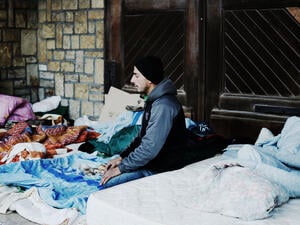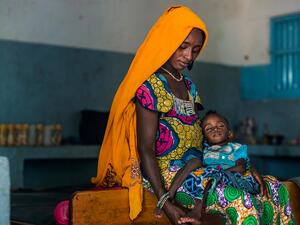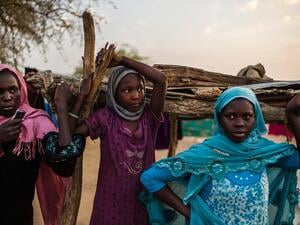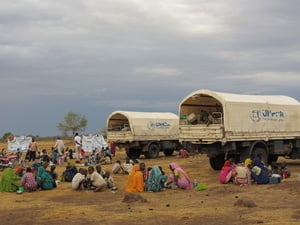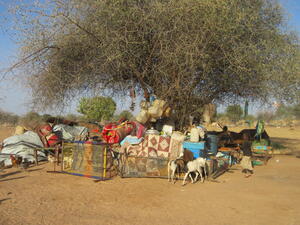Life eases slightly for refugees in corner of Central African Republic
Life eases slightly for refugees in corner of Central African Republic

A refugee woman from Darfur carries a sack of flour that was distributed at Sam Ouandja.
SAM OUANDJA, Central African Republic, July 10 (UNHCR) - UNHCR and sister agencies are helping to make life more bearable in this corner of north-east Central African Republic (CAR) for more than 2,600 refugees who fled attacks on their homes in Sudan's South Darfur region some seven weeks ago.
But conditions remain harsh in Sam Ouandja and getting supplies to the remote area located some 80 kilometres from the border with Sudan will become increasingly challenging during the rainy season. "It's difficult here," said Fatouma Ali Abakar, whose 20-year-old daughter has still not recovered from giving birth in Sam Ouandja three weeks ago to her first child.
Things are improving: the refugees have constructed waterproof shelters with plastic sheeting distributed by UNHCR; basic health services are being provided; and water for drinking and cooking is being treated.
And at the weekend, the World Food Programme (WFP) made a second distribution of food, which should last for three weeks. A WFP convoy carrying a further 51 tonnes of food was on its way on Tuesday to Sam Ouandja on rough roads from the distant CAR capital, Bangui. The agency has to date transported 105 tonnes of food here, including high-energy biscuits.
UNHCR has a team on the ground to manage the camp and, together with the local authorities, ensure the refugees' legal protection. A school for more than 600 children has been set up, while latrines and shelters for food distribution have been built. UNICEF, the World Health Organization, the Food and Agricultural Organization and the NGO Triangle are providing basic services such as education, access to water, food distribution and health services.
The local authorities and people of Sam Ouandja have welcomed the refugees despite having suffered themselves in recent months from conflict. The Sudanese, who fled air and ground attacks on their homes in the town of Dafak, have been given land on which to build shelters and grow food.
The refugees were in bad shape when they arrived. They had only mangoes and wild fruit to eat. Even now, aid agencies struggle to respond to their most basic needs and many continue to fall sick with malaria or diarrhoea. As the rains intensify, it is becoming more difficult to transport relief items along the 950-kilometre road from Bangui.
Analysts say the arrival of the more than 2,600 refugees in CAR is another sign that the Darfur crisis is affecting neighbouring countries. Some 235,000 refugees from West Darfur are sheltering in 12 UNHCR-run camps in eastern Chad. High Commissioner António Guterres has repeatedly called for an international presence along the CAR-Sudan and the Chad-Sudan borders.
CAR hosts some 8,600 refugees, mainly from Chad, Sudan and the Democratic Republic of the Congo. In the northern part, violence has forced an estimated 290,000 people to flee their homes since July 2005. Some 78,000 have sought refuge in neighbouring countries and 212,000 have been displaced within the country.
By Nicolas Rost in Sam Ouandja, Central African Republic


